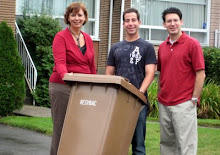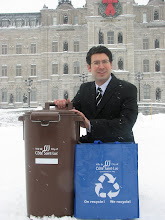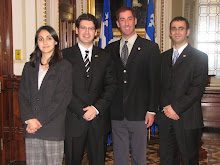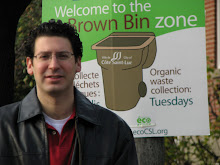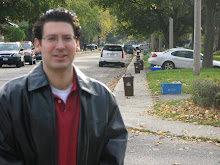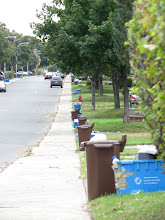On September 15, Cote Saint-Luc residents began receiving their new brown bins as part of phase 2 of the Organic Waste Collection program. Since then and continuing for the next few weeks, nearly 5000 homes will receive their new bin which includes a kitchen collector, a DVD, instructional material and sample compostable bags.
During the week of October 20, Cote Saint-Luc will become the first city on the Island of Montreal and one of the only cities in the province to offer curbside organic waste collection to all homes and duplexes. Instead of separating their garbage two ways (recycling and garbage), residents will now separate it three ways (recycling, garbage and organic waste).
After completing a year long pilot of 500 homes, Cote Saint-Luc has had several hurdles or complaints that we are working on overcoming. The first complaint was regarding the limited availability of certified compostable bags in the Cote Saint-Luc area. After approaching several stores, the bags are now available at 10 locations in CSL and the surrounding area:
IGA, Pharmpaprix and Dollarama (Cavendish Mall)
IGA, Jean-Coutu and Dollaram (CSL Shopping Centre)
Wal-Mart (Decarie & Jean-Talon)
Reno-Depot (St. Jacques St.)
City Hall (5801 Cavendish Blvd.)
Public Works Yard (7001 Mackle Rd.)
I am also currently in discussion with Loblaws and the Caldwell grocery stores to have the compostable bags available there as well. If there are other stores, where the bags should be available, please let me know. For food waste, residents can use certified compostable bags, paper bags or wrap their organic waste in newspaper before putting it in the brown bin for health and hygiene reasons. Garden waste can be put directly in the brown bins without any bags.
The second complaint has been with the size of the brown bin. For the first phase of the brown bin program involving 500 homes, all resident received 46.5L bins. These were the bins originally used by the homes in the Greater Toronto Area. Many homes found that they were too small and couldn't hold their garden waste.We also looked at the example of the City of Toronto, that decided to switch their organic waste bins for a larger size. CSL decided to go with 240L bins (similar to Halifax and many cities in Quebec) for phase 2 of the program and distribute the larger bins to all the homes in the pilot area. The new bins should be large enough to hold the organic waste from an average family aside from a few weeks during the peak leaf collection season when residents can place leaves in compostable bags next to their brown bins. At the same time, we put the new bins on display at all city facilities for about a month and residents had the choice to choose smaller bins, which we recommended for seniors or people with limited mobility.
The third problem has been with gardeners that are contracted by residents to mow their lawns and remove leaves. Most are still using black or orange plastic bags which are not compostable. the City of Cote Saint-Luc is holding a meeting with gardeners on October 7 to explain to them that we want them to put the garden waste directly in the brown bins of the homes they are paid to landscape or use compostable bags. We are looking into licensing gardeners who work within the boundaries of CSL. If gardeners don't abide by the rules and requirements of the organic waste collection, they will lose their license.
The fourth problem that we are working on solving is regarding funding for the program. So far, CSL is paying for the organic waste collection through funds from its regular budget. The provincial government set up a special fund for cities doing environmental initiatives. CSL's share of the fund is over $416,000. This would be enough to cover the entire budget of the Brown Bin Program and will be enough to pay for new blue bins for every home next year as CSL aims to improve its environmental performance. The only problem is that CSL has yet to receive even a cent of this money. We along with the other demerged cities on the Island of Montreal are the only cities that have not yet received their funds and have been waiting for over two years now. At the same time, over the last two years, the city of Montreal has received over $21.4 million and is only now instituting garden waste collection (food waste is not yet acceptable). Apparently a deal has been reached between the provincial ministry of environment, Montreal and the demerged municipalities for us to finally get the money that we are owed, but we are still waiting.
The fifth problem is with respect to finding a permanent treatment site. Originally CSL was sending its organic waste to a treatment site in St-Basile-Le-Grand operated by GSI Environment. In April, the provincial ministry of environment sent an inspector to our treatment site and issued them with a fine which in effect, shut them down. The public works department had less than a week to find a new site. Thankfully the City of Montreal has assisted us by allowing CSL to temporarily send our organic waste to the St-Michel (Miron Quarry) site in the east end of Montreal. We are still working on finding a permanent site and are hoping that Montreal will continue to help us. Montreal is currently working on a tender for organic waste treatment for CSL, Westmount and the Plateau Borough which are following our lead with curbside organic waste pilots. According to the current structure imposed by the provincial government, the demerged city (CSL) is responsible for the collection and transport of waste while the agglomeration (Montreal) is responsible for treatment. We are glad Montreal is taking their responsibility and we hope they will consult with us. Our recommendation is for Montreal to set up many smaller treatment sites, similar to the composter used at Concordia University's Loyola Campus.
The Cote Saint-Luc example has proved that residents are ready and willing to take the next step in recycling by including organic waste. This new initiative can be organized easily and with limited budgets. We are ready to help other cities follow our lead and have offered our services at the provincial level (to the Commission on Transport and the Environment on February 6) and to Montreal (to the Transport and Environment Commission of the Agglomeration of Montreal on June 9).
I am copying our key recommendations made on June 9, 2008 with respect to the Montreal Agglomeration's plan on the environment (PDGMR). For a look at the complete presentation, click here.
Recommendation 1a: In keeping with the spirit of the purpose of the PDGMR which is autonomie sectorielle, meaning treating your waste on the territory where it was created the plan should promote treatment of waste at the most local level wherever possible. This could include delegating authority and finances to the local municipality as was done with snow removal on arterial roads.
Recommendation 1b: Recognize the major role played by the boroughs and municipalities and ensure their budgets reflect this role.
Recommendation 2: The redevances must be used for the purpose for which it was intended, to finance innovative waste management initiatives, not to cover the cost of basic waste operations.
Recommendation 3: A forum of island-wide municipal representatives including Montreal and the reconstituted municipalities should be set to promote and share best practices with respect to the environment.
Recommendation 4: A special green fund should be set up for waste management to reward boroughs and cities that use best practices and achieve large gains in waste diversion.
Recommendation 5: The plan should set the target of diversion rate of at least 60% for all recyclable material by 2012, including organic waste.
Recommendation 6: The agglomeration should provide within six months a site for the disposal of food and yard waste collected by local municipalities (ie, Côte Saint-Luc, Westmount and Pointe-Claire) or finance the purchase and installation of a self-contained unit for organic waste treatment in situ (eg, Hot Rot).
Recommendation 7: If the agglomeration of Montreal cannot provide an adequate, permanent licensed site for organic waste treatment within the next six months, it must delegate their authority and the appropriate financing on waste treatment to the local municipality.
Recommendation 8: The agglomeration government should work with industry and business associations throughout the island to agree upon a timetable for all businesses on the island to transition from plastic bags to compostable or paper bags (eg, SAQ, see Annex C)
Recommendation 9: The agglomeration of Montreal needs to ban the use of plastic bags for the collection of leaf and garden waste. The agglomeration government should ensure that paper and compostable bags are available at retail locations and municipal facilities throughout the island.
Recommendation 10: The agglomeration of Montreal needs to work with industry to encourage the implementation of a facility to recycle type 6 plastic.
Recommendation 11: If it is not possible to create a facility that can recycle type 6 plastic, the agglomeration of Montreal needs to work with industry and business associations throughout the island to agree upon a timetable for to phase out permanently type 6 plastic for household products.
Recommendation 12: The Agglomeration government needs to work with the City of Côte Saint-Luc and other cities that have implemented organic waste collection to produce a turnkey (clé en main) plan that municipalities and boroughs can easily follow to implement their own curbside organic waste collection program.
Recommendation 13: The agglomeration of Montreal must increase the amount of public awareness through a widespread media campaign on waste management including more detailed education on what is and isn’t recyclable and organic waste collection.
Recommendation 14: The plan must promote and encourage local business enterprises to implement new technologies transform, sell, recycle and exchange all the resources which result from post-consumer waste.
Recommendation 15: Municipalities on the island of Montreal should adopt buy green policies to increase the demand for products made from recycled materials and post-consumer waste.
If you'd like more information about the program, or to volunteer with the implementation, please contact me at serdelyi@cotesaintluc.org
Sunday, September 28, 2008
Subscribe to:
Posts (Atom)
